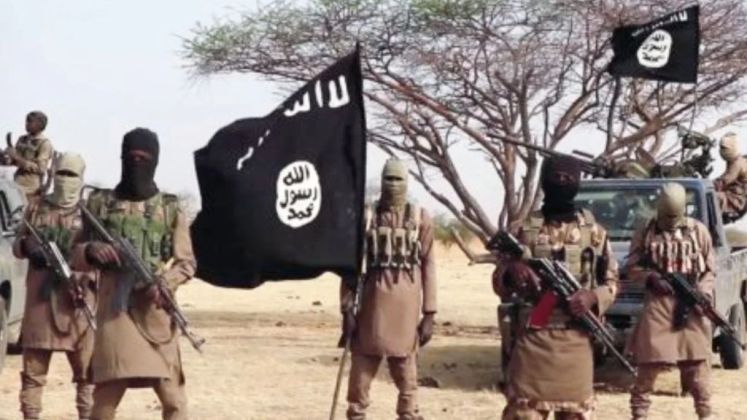By HeadlineNews.News Special Investigative Report.
In the early hours of Monday, May 12, 2025, suspected Boko Haram insurgents—operating under the Islamic State West Africa Province (ISWAP)—stormed a Nigerian military base in Marte Local Government Area of Borno State, overwhelming troops of the 153 Task Force Battalion and capturing several soldiers.


Local intelligence sources confirmed that the base was overrun around 3 a.m., with fatalities, seized weapons, and the destruction of military hardware including armored tanks. Survivors reportedly retreated to the 24 Task Force Brigade in Dikwa, raising alarms across Nigeria’s security establishment.
“ISWAP has taken over Marte,” a military source disclosed.
“An unspecified number of soldiers were killed, some captured, and others escaped toward Dikwa.”
Historical Context: Marte—A Recurring Flashpoint
Marte is no stranger to insurgent aggression. In 2015, it was briefly declared part of Boko Haram’s “caliphate.” The town has changed hands multiple times over the past decade, despite repeated military operations.

In February 2021, the Nigerian Army reported recapturing Marte from ISWAP after heavy airstrikes.
Yet in December 2022, ISWAP again ambushed patrol units in the area.
The recent breach reflects a troubling cycle: temporary gains by the military, followed by strategic insurgent retaliation.
Borno & the Human Cost of Conflict
Over 35,000 people have died since Boko Haram’s insurgency began in 2009.
More than 2.5 million Nigerians have been internally displaced.
Borno State remains the epicenter, with towns like Gwoza, Baga, Konduga, and Marte repeatedly targeted.
According to the Global Terrorism Index 2024, Nigeria ranks 8th among the world’s most terrorized nations, while ISWAP is now the third-deadliest terrorist group globally.

What Went Wrong?
Military analysts point to several possible lapses:
Intelligence failure: The attack occurred at 3 a.m., suggesting insurgents were able to plan and assemble without detection.
Base vulnerability: Marte is isolated, and Forward Operating Bases (FOBs) often suffer from low manpower and delayed reinforcement.
Insurgent regrouping: Recent airstrikes had weakened ISWAP cells, but lack of ground consolidation left room for reprisal.
General Chris Olukolade (rtd) once warned:
“Victory in counterinsurgency is not about territory reclaimed—it is about territory retained and secured.”
Global Comparisons: What Other Nations Did Right
Colombia defeated the FARC insurgency through a “Security Dagger” doctrine—holding captured areas with civilian-military joint forces and rebuilding trust with local communities.
Sri Lanka used precision intelligence and a deep penetration strategy to finally end its 26-year war with the Tamil Tigers.
Kenya, after the 2013 Westgate attack, reformed its military-police intelligence coordination—cutting terror fatalities by 40% in 5 years.
Nigeria must draw from these blueprints—not just militarily, but politically and psychologically.

What Must Be Done: Recommendations
1. Revive Civil-Military Intelligence Networks: Community-driven intelligence units must be empowered to monitor infiltration routes.
2. Fortify FOBs with Technology: Deploy thermal drones, early-warning systems, and backup generators to eliminate blind hours.
3. Massive Recruitment of Local Rangers: The Civilian Joint Task Force (CJTF) should be trained, armed, and integrated formally under the military structure.
4. Establish Permanent Garrisons in Recaptured Towns: Stop the “capture-and-leave” cycle.
5. Political Devolution of Security: Allow states like Borno to fund and manage state policing and rapid-response units.
6. Reinforce Regional Collaboration: Restructure the Multinational Joint Task Force (MNJTF) with Chad, Niger, and Cameroon for coordinated border security.
The Stakes Are High: A National Wake-Up Call
Nigeria cannot afford to normalize the loss of soldiers, towns, and territory. Every successful insurgent raid emboldens terrorist propaganda, undermines troop morale, and destabilizes an already fragile region.
“The strength of a nation is not just in its arms, but in its will to defend every inch of its soil,” said Princess G. Fraser, MFR, of the National Patriots.
“We must wake up and fight not just battles—but the war for Nigeria’s soul.”
Conclusion: A Call to Action, Not Despair
The fall of Marte must not become a forgotten headline. It must spark renewed urgency in Abuja to redefine national security, prioritize soldier welfare, and fix our fractured counter-terrorism doctrine.
The lives of the captured soldiers and the safety of Borno’s people depend not on speeches—but on strategy, technology, and leadership.
Marte is not just a town. It is a symbol. And today, that symbol is burning.
Headlinenews.news Special Investigative Report




